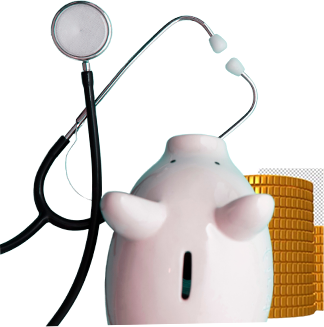PERSONALIZED DIET PLAN FROM
Dietitians and Nutritionists for Depression

Contact Us
Diet is one of several variables that affect depression, a complex mental health illness. Consulting with a dietician and nutritionist provides a focused, scientifically supported method of enhancing mental health via individualized dietary practices. A nutritionist for depression looks closely at your eating patterns to identify any vitamin deficits that could be contributing to your feelings of sadness. They also help you make informed nutritional choices by providing helpful information regarding the relationship between diet and mental health.

Role of a Nutritionist for Depression
Nutritionists and dieticians for depression can create personalized meal plans that promote brain health and tackle eating behaviors such as stress eating and skipping meals, which may worsen depressive symptoms. A nutritionist might recommend lifestyle changes alongside dietary options, like managing stress and increasing physical activity. Collaborating with a nutritionist can enhance conventional depression treatments by integrating various approaches, boosting their efficacy and improving overall quality of life
Key Nutritional Components for Managing Depression
Since some nutrients support the best possible brain function, nutrition is essential for mental health. The following are some essential dietary components that might help with depression management:
Essential Nutrients
Minerals and vitamins are essential for mental health. Depression symptoms are often linked with deficiencies in B-complex vitamins, vitamin D, magnesium, selenium, and zinc. Likewise, the brain and emotional control depend on omega-3 and omega-6 fatty acids. Examples of antioxidants that help eliminate free radicals that might damage brain cells are vitamins A, C, and E. This improves cognitive performance.
Complex Carbohydrates
Consuming complex carbohydrates, found in whole grains, fruits, and vegetables, stabilizes blood sugar levels and aids serotonin production. This neurotransmitter is critical for mood regulation and maintaining emotional stability.
Amino Acids
Tryptophan and phenylalanine, two important amino acids found in proteins, are building blocks for neurotransmitters, including dopamine and serotonin. A diet high in protein can improve mood and cognitive performance.
Hydration
Maintaining enough hydration is essential for mental clarity and general well-being. Dehydration can induce mental exhaustion and irritation; therefore, it’s critical to drink adequate water.

How can a Nutritionist Help Manage Depression?
Collaborating with a nutritionist can play a vital role in managing depression by addressing nutritional deficiencies and promoting a balanced diet that supports mental health.
Personalized Dietary Assessment
A nutritionist for depression examines your eating patterns to identify any nutritional deficiencies and develops a diet plan tailored to your requirements. This method guarantees that dietary adjustments are specially created to meet your lifestyle and health objectives.
Development of Healthy Eating Patterns
Depression often impairs energy and appetite, which makes cooking difficult. Even on days when energy levels are low, nutritionists design nutrient-dense, easy-to-make meal and snack combinations.
Support for Lifestyle Changes
Nutritionists use a comprehensive strategy that incorporates dietary changes with stress reduction, exercise, and improved sleep patterns. This comprehensive strategy encourages wellness in general.
Gut Health Optimization
The connection between the gut and brain significantly influences mental health. Nutritionists emphasize that probiotics, foods high in fiber, and essential vitamins can enhance gut health, positively affecting mood and cognitive abilities.
Common Diet Plans for Depression Management
The following are some of the commonly advised diet plans for depression management.
Mediterranean Diet
Whole grains, fruits, vegetables, nuts, seeds, and healthy fats like olive oil are the main components of this diet. Packed with omega-3 fatty acids and antioxidants, it enhances mental and emotional well-being.
DASH Diet
The goal of the Dietary Approaches to Stop Hypertension (DASH) diet is to increase the intake of fruits, vegetables, and lean proteins while decreasing consumption of processed foods and salt. It fosters a balanced nutrient intake, which is crucial for mental health.
Anti-Inflammatory Diet
Depression symptoms have been connected to inflammation. Anti-inflammatory diets, which include leafy greens, berries, and fatty fish, help lower inflammation and improve mental health.
Plant-Based Diets
Essential nutrients and fiber are provided by a diet high in fruits, vegetables, legumes, and whole grains. These nutrients support better gut health and resilience in general.


Recommended Foods for Depression
Incorporating nutritionist-rich food into your diet can help you recover from depression. Here are some of the recommended foods:
Mood-Boosting Foods
It is well known that some foods improve mood and brain function. These consist of:
- Omega-3 Fatty Acids: Found in salmon, walnuts, chia seeds, and flaxseed oil.
- Vitamins D: Present in oily fish, fortified dairy, and eggs.
- Antioxidants: Abundant in blueberries, spinach, and other colourful fruits and vegetables.
- Tryptophan-Rich Foods: Found in turkey, chicken, eggs, and legumes.
Essential Nutrients
Recommended essential nutrients are:
- B Vitamins: Found in leafy greens, whole grains, and dairy products.
- Magnesium and Selenium: Found in nuts, seeds, and whole grains.
- Zinc: Found in shellfish, poultry, and beans.
Hydrating Foods
Including hydrating fruits and vegetables such as cucumbers and watermelons aids in sustaining hydration, vital for mental clarity.
Probiotic Foods
Yogurt, kefir, and fermented foods like sauerkraut are excellent for gut health, which can influence mood.
Foods to Avoid
Refined sugars and carbs: These can cause fluctuations in energy levels, negatively impacting mood.
Processed foods: They are often high in harmful fats and lacking in nutrients, which can exacerbate the symptoms of depression.
Excessive Alcohol: Drinking alcohol might worsen depression and interfere with sleep cycles.
Caffeine: Consuming large amounts of caffeine, particularly in the evening, may disrupt sleep and increase anxiety.
Why Choose QUA Nutrition for Depression Support?
QUA has a team of experienced dieticians and nutritionists, who offer personalized, science-based guidance to enhance mental well-being via nutrition. Registered dietitians with expertise in mental health develop customized meal programs at QUA Nutrition to satisfy the needs of each customer. Thorough evaluations guarantee that every facet of your nutritional health is considered. Our nutritionists for depression focus on combining dietary modifications with lifestyle adjustments. Working alongside healthcare professionals, we utilize a multidisciplinary strategy to address depression. Apart from nutrition, QUA nutritionists provide ongoing support and motivation, assisting clients in maintaining lasting positive transformations.
Contact us to book your appointment with our nutritionist for depression treatment.

Q: Can a nutritionist cure depression?
A: Although a nutritionist cannot heal depression, they play an important role in reducing symptoms by correcting dietary deficiencies and enhancing overall brain health.
Q: What is the role of nutrition in mental health?
A: Nutrition influences neurotransmitter activity, energy levels, and mood control. A diet abundant in nutrients promotes brain wellness and alleviates symptoms of depression.
Q: Are there specific diets recommended for depression?
A: Yes, diets such as the Mediterranean, DASH, and anti-inflammatory types are successful in addressing depression because of their nutrient-rich compositions and brain-supportive components.
Q: How long does it take to see results from dietary changes?
A: Improvements vary, but many individuals notice enhanced energy and mood within a few weeks of adopting a healthier diet.
Q: How does QUA Nutrition differ from other services?
A: QUA Nutrition’s personalized, evidence-driven approach integrates nutrition and lifestyle modifications, ensuring comprehensive care and support.


